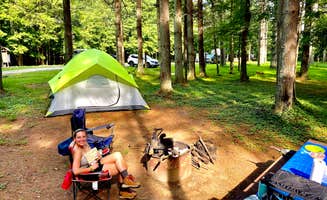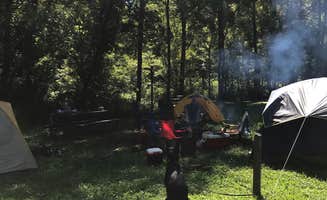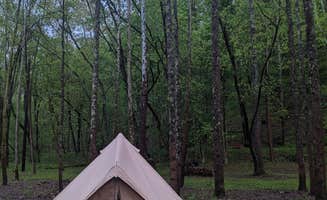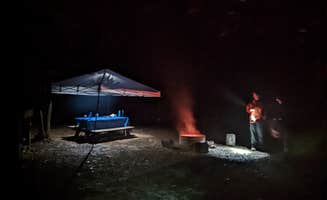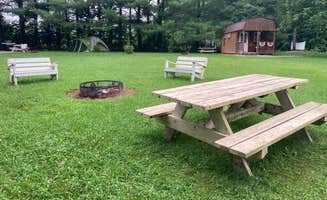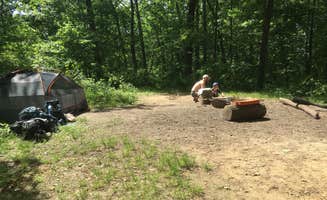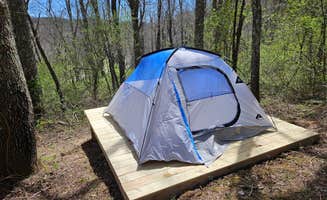Tent camping near Parkersburg, West Virginia primarily takes place within the boundaries of Wayne National Forest across the Ohio River. The region sits at the foothills of the Appalachian Mountains with an average elevation of 700-900 feet and experiences humid summers with temperatures regularly exceeding 85°F. Most campgrounds in the area operate without staff on-site, requiring campers to self-register at information boards.
What to do
Trail exploration on horseback: Wayne National Forest's Kinderhook Horseback Riding System connects to the Kinderhook Trailhead campground where tent campers can set up before or after riding. As one camper noted at the nearby trailhead, "With it being an equestrian trail, there were a lot of horses and trailers throughout the day. Before sunset, everyone cleared out and only campers remained."
Mountain biking at Baileys Trail: The 30+ mile trail system near Athens is accessible from Benton's on the Baileys tent camping area. A camper confirmed the location is "near the Baileys Bike System" and another mentioned the campground offers "extremely private primitive camping surrounded by Wayne National Forest and steps from the Baileys Trail System."
Creek fishing: Many campsites are located near small waterways where fishing is permitted without a license when on federal land. A visitor at Hune Bridge Campground mentioned "The creeks are also great for fishing and float trips" and that "this campground also serves as the local 'take out' for the river."
What campers like
Privacy and seclusion: Baileys Trail Tent Camping receives high marks for its secluded setting. One camper praised the "nice wide open space surrounded by woods" and another valued "that 'far out' feel just outside of town." Long-term campers particularly appreciate the privacy, with one noting they were "happy I had this place to call home for the past couple months."
Historic structures: Several campsites feature preserved historic buildings. The Hune Bridge Campground contains an "adorable little campground, with a historic covered bridge and lovely creek in the backyard." Another camper called it "a covered bridge in your backyard," noting that "within the national forest, you will find some historic covered bridges, churches, homes, general stores."
Free camping options: Most primitive tent sites in Wayne National Forest have no fees. One camper noted the practical benefit: "It is completely FREE, and you can stay for up to 14 days. There are a couple other small campgrounds in the area similar to this one." This allows campers flexibility for extended stays without reservations.
What you should know
Limited facilities: Most tent camping areas have basic or no amenities. Even at Zaleski State Forest, which offers more developed facilities, campers should be prepared for rustic conditions: "Backpacked there for 3 days/2 nights. Good trail and campsites had water, but it can get a little humid and buggy there."
Cell service constraints: Coverage varies dramatically across the camping areas. Some locations have surprising connectivity, with one camper reporting "perfect AT&T and Sprint cell service" at Kinderhook Trailhead, while others report "no phone service within 4-5 miles of the campground" at Lane Farm Campground.
Weather considerations: The region's humidity affects camping comfort significantly. Campers often mention shade as a critical factor, with one noting: "No privacy between sites but a good deal of shade, especially site #4 in the afternoon." Another mentioned a site "probably wouldn't be much fun in the heat of the summer" due to limited shade.
Tips for camping with families
Choose sites with accessible amenities: Benton's on the Baileys offers clean facilities despite requiring some walking: "You have to walk to the site, up a steep hill, but it is very private and quiet. The bathrooms are down the hill too, but very clean and private. There are showers too."
Prepare for wildlife encounters: Local fauna adds educational opportunities for children. One family camping at Zaleski noted they "saw lots of wildlife, we have seen salamanders, deer, snakes, a wild turkey even wandered into our camp." Bringing field guides helps identify creatures.
Pack water treatment solutions: With unreliable water sources, families need portable filtration. A camper advised: "No drinking water is available, but there are creeks all around, so come prepared with a water filter!" This teaches children practical outdoor skills while ensuring hydration safety.
Tips from RVers
Size restrictions matter: Small campgrounds often have limited turning space. At Lane Farm Campground, a camper with a small trailer noted: "It's designed for tent camping, but Hamlet (our small camper) fit fine with some strategic parking." Large RVs will struggle at most primitive sites in the region.


